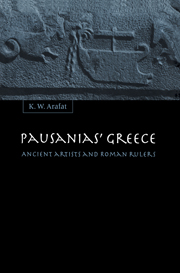Book contents
- Frontmatter
- Contents
- Map of Roman Greece
- Preface and acknowledgements
- List of abbreviations
- Chapter 1 Introduction
- Chapter 2 Pausanias on the past
- Chapter 3 Pausanias on the rulers of Roman Greece 1: introduction, Mummius and Sulla
- Chapter 4 Pausanias on the rulers of Roman Greece 2: Caesar and Augustus
- Chapter 5 Pausanias on the rulers of Roman Greece 3: Nero to Marcus Aurelius
- Chapter 6 Pausanias on Herodes Atticus and other benefactors
- Chapter 7 Conclusions
- Bibliography
- Index of Pausanias passages cited
- Index of other authors and passages cited
- General index
Chapter 1 - Introduction
Published online by Cambridge University Press: 22 September 2009
- Frontmatter
- Contents
- Map of Roman Greece
- Preface and acknowledgements
- List of abbreviations
- Chapter 1 Introduction
- Chapter 2 Pausanias on the past
- Chapter 3 Pausanias on the rulers of Roman Greece 1: introduction, Mummius and Sulla
- Chapter 4 Pausanias on the rulers of Roman Greece 2: Caesar and Augustus
- Chapter 5 Pausanias on the rulers of Roman Greece 3: Nero to Marcus Aurelius
- Chapter 6 Pausanias on Herodes Atticus and other benefactors
- Chapter 7 Conclusions
- Bibliography
- Index of Pausanias passages cited
- Index of other authors and passages cited
- General index
Summary
In the course of describing his travels in mainland Greece in the second century ad, Pausanias explicitly and implicitly reveals many of his attitudes and preferences towards the past and the present which governed, and arose from, those travels. In this book, I consider how Pausanias approached and carried out the task he had set himself. The major part of the study concerns his attitudes to the Romans in Greece, but his attitudes to the past are also considered, and it is a central tenet that Pausanias' examination of the present is indistinguishable from that of the past, indeed that the former was shaped to a significant extent by the latter. Pausanias himself is the starting point of this study: it is not a study of Greece and Rome, nor of provincial attitudes, Roman buildings, or individual emperors. It would not be possible (even if it were my intention) to look at all that the Romans built or dedicated in Greece nor at their pervasive impact on life in the province of Achaia.
There have been several full-scale commentaries since the pioneering (and still, in some respects, unsurpassed) work of Sir James Frazer. The ever-growing wealth of archaeological evidence (mostly confirming the value of Pausanias) increasingly renders the compilation of a comprehensive commentary an impractically burdensome task. In tandem, there have been many articles and monographs on aspects of Pausanias, including several in recent years, of which that by Christian Habicht is the broadest in scope.
- Type
- Chapter
- Information
- Pausanias' GreeceAncient Artists and Roman Rulers, pp. 1 - 42Publisher: Cambridge University PressPrint publication year: 1996

